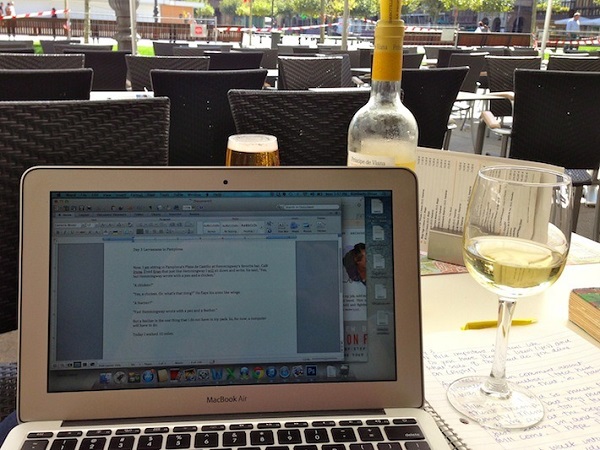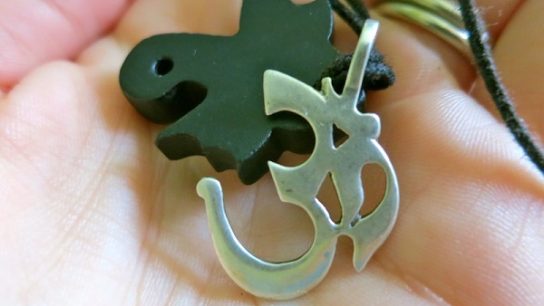When I started this blog no one read it. My mom didn’t even read it. I’d get maybe 15 hits a day and each one made me ecstatic. I was happy because I was writing. But I was also terrified because I was writing on the Internet where someone might read it.
My Little Blog

It’s been three years and three months since I claimed this little corner of the World Wide Web as my own. This blog has grown in ways I never dreamed possible. It has become the place where I chronicle the big and small moments of my life, a forum for meeting like-minded people, and even a source of income.
I know that a lot of you who read this blog have blogs of your own. I don’t write about blogging much but I figured it’s high time that I share what I’ve learned along the way.
Blogging from a cafe in Pamplona, Spain. Things could be worse.
Anyway, here are 30 important lessons I’ve learned about blogging in the last few years. I’d love it if you’d leave your tips and lessons in the comments below.
30 Important Lessons
1. It’s terrifying to start a blog and put those first words out on the Internet. But unless you’re Princess Kate or Lady Gaga rest assured that no one is reading. That’s not to say they won’t read eventually, but they’re not reading now. So don’t worry too much that your boss will stomp into your cubicle tomorrow, pull you into her office, and say, “You’re thinking of quitting your job to TRAVEL?” She won’t do that. Because she’s not reading your blog.
2. Don’t name your blog with hyphens. DON’T DO IT! I abhor the hyphens in my URL (so-many-places.com). Someday you’ll find yourself interviewed on TV or a podcast and the commentator will ask what your blog is called. “It’s So Many Places.com.” You’ll say. “But with hyphens in between the words!” And everyone at home will think, “Now, what is a hyphen again? Oh yeah, it’s that dash that married people use in their last names. Hyphens, man, those aren’t very relevant…” And the only thing they’ll remember about your blog was that there were hyphens in there somewhere. I wish I’d just named my blog Kimdinan.com.
3. Please for the love of God do not use pop-ups. If someone wants to like your Facebook page or sign up to receive email updates they’ll do it from the sidebar.
4. Blog because you love to write or because you’re passionate about whatever you’re blogging about. If you’re starting a blog to make money, don’t. Because you probably won’t. Write because there’s something you want to say. Write because you can’t not write.
5. Figure out how you are different. It might be hard for you to see how you are different so ask a group of people you trust to tell you how you are different. It will take you a while before you find your voice but you’ll find it. What makes you uniquely you? Perhaps you have a passion for popsicles mountain toy trains or artisan peanut butter. Unbrave Girl writes about cookies and cats. It works for her. It’s funny. Whatever you love, put it into your writing.
6. Respond to the comments on your blog. If someone takes the time to leave a thoughtful comment on your blog you owe him or her the time to respond to it.
7. Respond to emails. Absolutely respond to emails! Chris Guillebeau is a best-selling author and blogger. I emailed him once and he wrote me back. I’m a fan of life. Your readers matter. If you don’t commit to them they won’t commit to you.

8. Don’t apologize if you disappear for a week or two. Everyone needs a vacation. Your readers will read you when you’re there but they won’t miss you when you’re gone. And they certainly won’t ditch you for taking a few weeks off.
9. If you want to connect with your audience tell the truth. Tell the truth even though it scares the shit out of you as you hit publish. In a world so full of crap and gossip we long to hear words that connect us, that make us say, “I feel that way too!” So tell the truth. Your readers will see through you otherwise.
10. Seriously, you don’t have to be perfect. Just tell the truth.
11. If you’re starting a new blog use wordpress.org (not .com). Buy your domain. Be self-hosted. If you don’t start this way it will be a pain when you switch over later.
12. When your website goes down or a plugin malfunctions stay calm. It is not the end of the world if your website is not working at 2 a.m. You will get it fixed. No, you will.
13. Keep your plug-ins and themes up-to-date to prevent hacking. If a plugin malfunctions it is probably because you just updated it. Uninstall it and then reinstall it. There, I just saved you a night of panic.
14. Proofread. Find a good proofreader friend and have him read everything you write. And then take it easy on yourself when, three days later, you catch a typo you missed. I’ve read this blog post 45 times. I know there’s a typo hiding in here somewhere.
15. Read your posts out loud before you publish them. You’ll catch your mistakes and hear if something doesn’t flow.
16. Ignore the negative comments and crappy reviews as much as possible because if you are out here long enough someone is going to say something mean about you. Don’t let it get you down. Just know that you’ve reached the stage where people are beginning to feel jealous. Or, maybe they just hate you. What can you do about it? Just move on. It’s hard, but move on. And don’t sink to their level. The Oatmeal sums this up perfectly.

17. Although most people don’t, it is possible to make a living as a blogger. But it is helpful if you use your blog as a platform to sell other things: your books, your art, your photographs, or your consulting business. If you want to work online, diversity is the name of the game.
18. Be patient. Six months of blogging is nothing. 1 year is nothing. Write good stuff. Build your audience. Be genuine. Tell the truth.
19. Tell the stories you want to tell. Don’t succumb to run-of-the-mill Top 10 posts. If you write for Google people will notice. Maybe you want to write for Google. Fine. But don’t expect people to stick with you through the years.
20. Don’t post something just to post it. Make it good. Remember, no one will miss you when you’re gone for a week or two. Take the time to write something worth reading.
21. A block of 1,000 words will make your readers’ eyes pop out of their heads. It’s okay to make a blog post 1,000 words or more if you have something to say. But most times, shorter is better. 400-800 words are perfect. I realize I did not follow my advice with this post.
22. Pictures matter. Spend some time learning how to edit your photos. Use photos that help you set the scene and tell the story. Here is a wonderful post by The Beautiful Occupation about photo management and editing.
23. Connect with the people that write the same things you do. Join Facebook groups. Send emails. Comment on their blogs. This is your community. They will help you when your site goes down and your plugins malfunction at 2 a.m. They will give you tips and encourage you and meet you for dinner when you find yourself alone in some foreign town. They will share your content and help you build your audience. They are your allies, not your enemies.
24. Don’t commit to a schedule. Don’t do a Travel Tip Tuesday column or a Sunday Shore photo series. Your readers don’t care and you’ll come to resent the Saturday evenings you’re spending at home digging through old beach photos that no one wants to see anyway.
25. Unless you have some kind of rapport with the person you are contacting, don’t ask other bloggers if you can trade links, be added to their blogroll, or they will share your latest post on Facebook or Twitter. It’s rude. You wouldn’t ask a stranger in real life to vouch for your work, would you? Build a relationship first, and then ask. But don’t ask too often. Save your requests for when you need them, like when you’re promoting a new project or book.

26. When writing, cut out the first two paragraphs and the last. The story is in the middle. This rarely fails.
27. If you’re serious about your blog, invest a little money upfront. I had a crap design for the first two years my blog existed. It’s amazing how traffic picked up once I redesigned my blog. A good design matters. (Here is my designer, she is great).
28. Start gathering your mailing list from the get-go. Have an email sign-up on your sidebar or ask people to sign up for a once-a-month newsletter. Offer a free download in exchange for an email address. Build your list! I wish I’d done this from the beginning. Some day, that mailing list will be as valuable as gold, especially if you find yourself pitching books to agents.
29. If another blogger asks you to write a guest post for their site, say yes, especially if that site has a bigger following than you do. This is how you will grow your readership.
30. Your reputation will precede you so you must conduct yourself on the Internet as you would in real life. Hiding behind the computer screen does not give you the green light to be an asshole. So don’t be an asshole. Or, do be an asshole if that is what you’re going for. But just know that eventually, your real personality will shine through, for better or worse.






